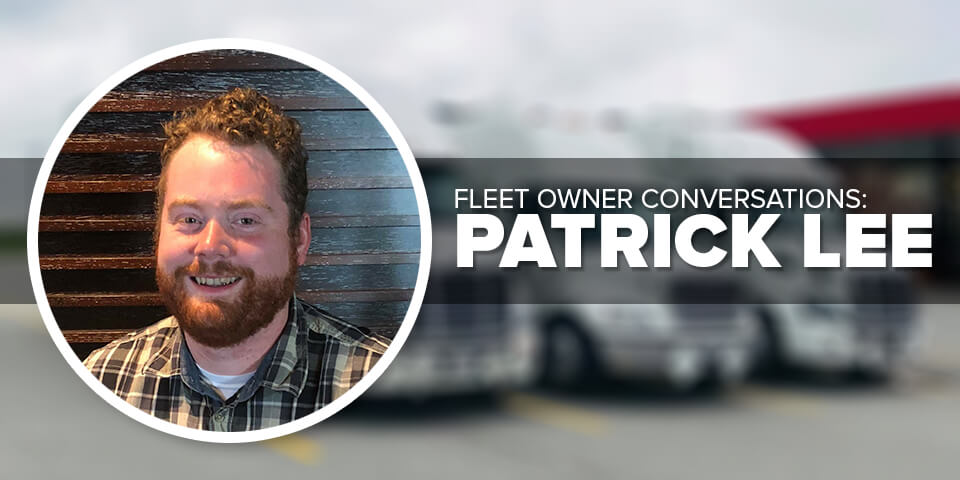In The News

Fleet Owner Conversations: Patrick Lee
Meet Patrick Lee. Patrick is a former freelance sound and video production technician who worked with headliner acts such as Miley Cyrus, Blake Shelton, and Charlie Daniels. He got into expedited trucking in 2012 as a team driver for a fleet owner with his business partner Eric Hyfield. About six months later, they bought their first truck to become owner-operators.
Then, in 2014, they took the plunge into fleet ownership by purchasing their second truck. And today, only four years later, Hyfield Trucking has grown into a fleet of 27 vehicles -- 22 refrigerated straight trucks, three dry-box straight trucks, and two tractors -- with 10 trucks added this year alone.
So, what led Patrick to expedited trucking? How did he get started as a fleet owner? What challenges has he encountered? And what advice does he have for others who may be considering becoming an expedite fleet owner?
EO recently spoke with Patrick to learn more about his story. Here are edited highlights from our conversation.
EO: Take me back to how you first got into expediting. What led you from your freelance career in the entertainment industry to expedited trucking?
Patrick Lee: I was a freelance production guy, so I worked for a whole bunch of different companies. And the summertime every year was slow. Fall, winter, and spring were my busy seasons. But summers were pretty quiet.
So, I would go out and hustle to get work where I could find it. And at the time, I owned a cargo van, which got me thinking about how I could find work using my van during the summer of 2012 to make a few dollars while waiting for the fall season to kick back up.
That lead me to research companies in expediting, where I could use my cargo van. But the more research I did, I found out a couple of things. First, I found out that the cargo van I had was way too old to be used by anybody. Secondly, I found out about this straight truck and fleet ownership deal, and I spent a lot of time on the ExpeditersOnline forums researching them. I got with Eric, and he saw the potential business opportunity that I saw, and we started talking about how we could build a business from the ground up, by driving for an owner first, then moving on to buying a truck, and then growing a fleet. And that's what we did.
The first three trucks you bought were used. But then you committed to buy only new vehicles. Why is that?
Better repair and maintenance intervals. The main thing is constant operation because downtime can get expensive. It sounds crazy. You’d think, how can a more expensive new truck be cheaper to operate than a used one? But the numbers don't lie.
I mean a lot of people still have to buy used trucks to get started in the industry. That’s what we did with our first three trucks. But when you can afford it, it's better off to buy that new truck.
Now when you first started as a team driver for a fleet owner, did you have fleet ownership in mind?
Yes. Fleet owner was the plan from the time we even said, “Let's make this a go.”
How has the experience from your past career as a freelancer helped shaped your approach to business as a fleet owner?
Being a freelancer, you constantly have to sell yourself. The employers that hire you out never have to hire you again. So you always have to be your best self—always.
So with that comes honesty, integrity, and then being able to work well with people, especially when problems arise, where you’re not digging your feet in the ground and complaining, but you’re looking for a way and a solution around it. So, I think those are some of the things that have helped me become, what I hope, a better fleet owner.
Were there periods in your business journey where you hit a wall in your business where you're like, "What did we get ourselves into?"
Yeah. The winter of 2016 was brutal for us. The goal at that point was to keep the company afloat and to keep pushing through it, hoping the market would change, and thankfully it did. But no matter how tight it got, we always paid our people. We always paid our bills. And we were incredibly blessed to make it through, but it got pretty scary a couple of times during that period.
What advice do you have to give to other expediters who may be considering becoming fleet owners?
Partner with carriers that have your back. Partner with carriers you can make money with. And do a ton of research. I encourage people to talk to other fleet owners, talk to recruiters, talk to drivers. Get as much research as you possibly can about the companies you're going to be partnering with.
Remember that, as a fleet owner, you have two customers—your drivers and your carrier. You have to serve both of them. I think that's crucial. A lot of stuff I hear in the industry is that carriers complain about their fleet owners, that they’re difficult to work with. I think that happens when the fleet owner forgets that they’re providing a service to the carrier, not the other way around.
And then you have to always remember that your drivers are the backbone of your company and should be treated that way—with respect. You have to pay them on time and not take them for granted.
Finally, be fiscally responsible. Even when you have a good sum of money coming in, you need to be smart with that money. Business is good right now. But it's going to turn at some point, and you need to have the cash on hand when that happens.





